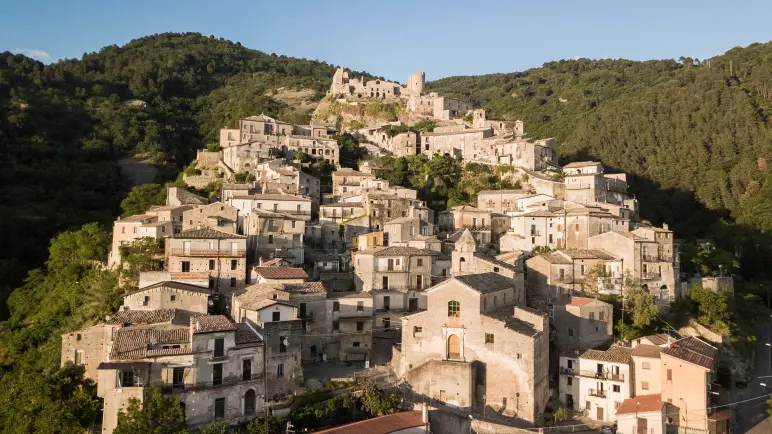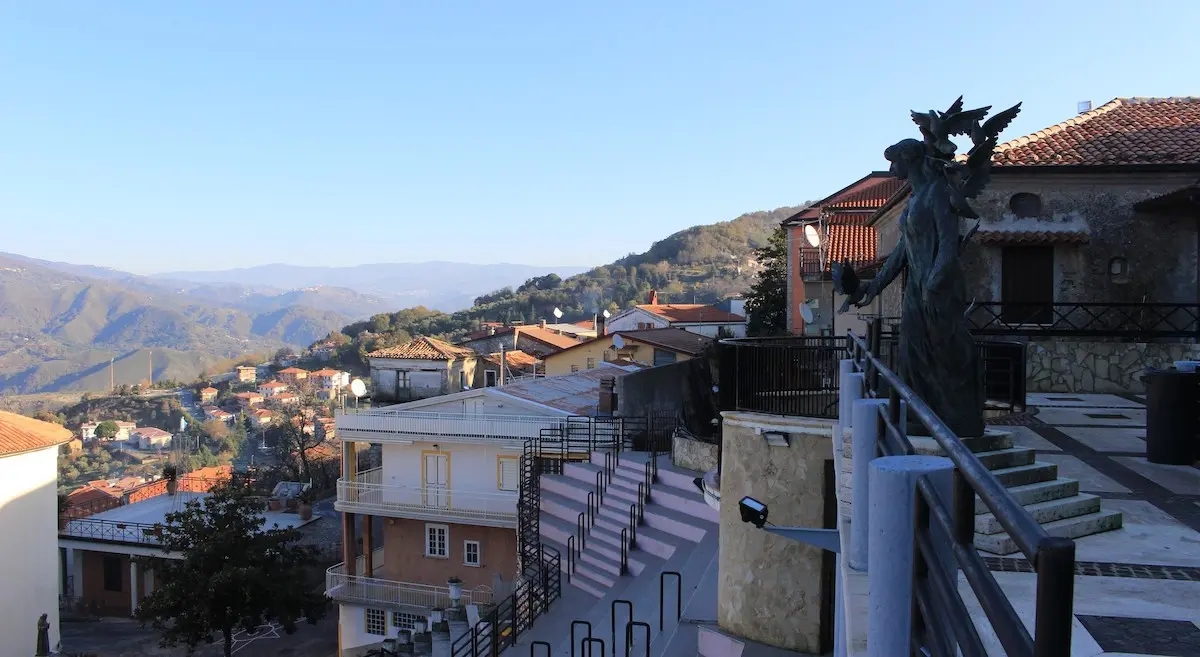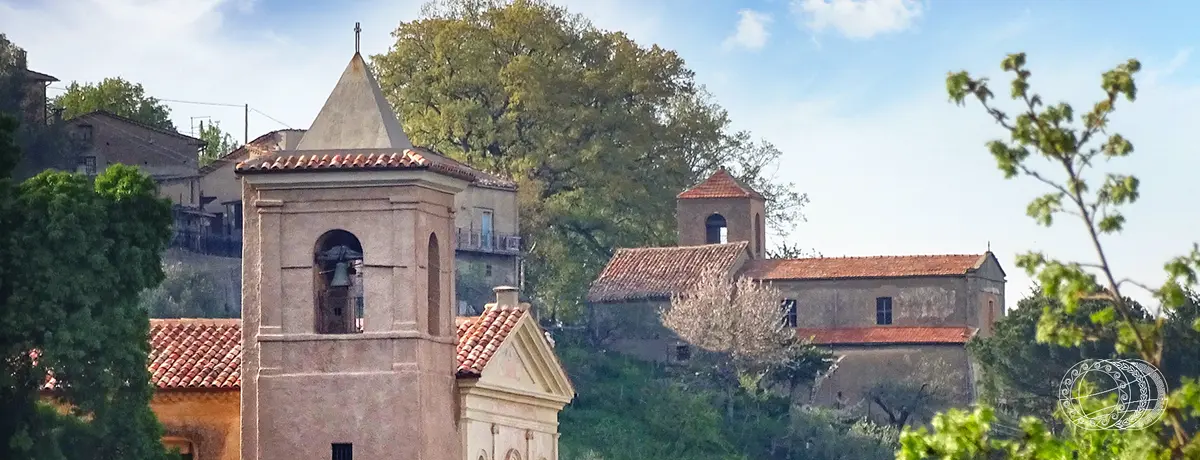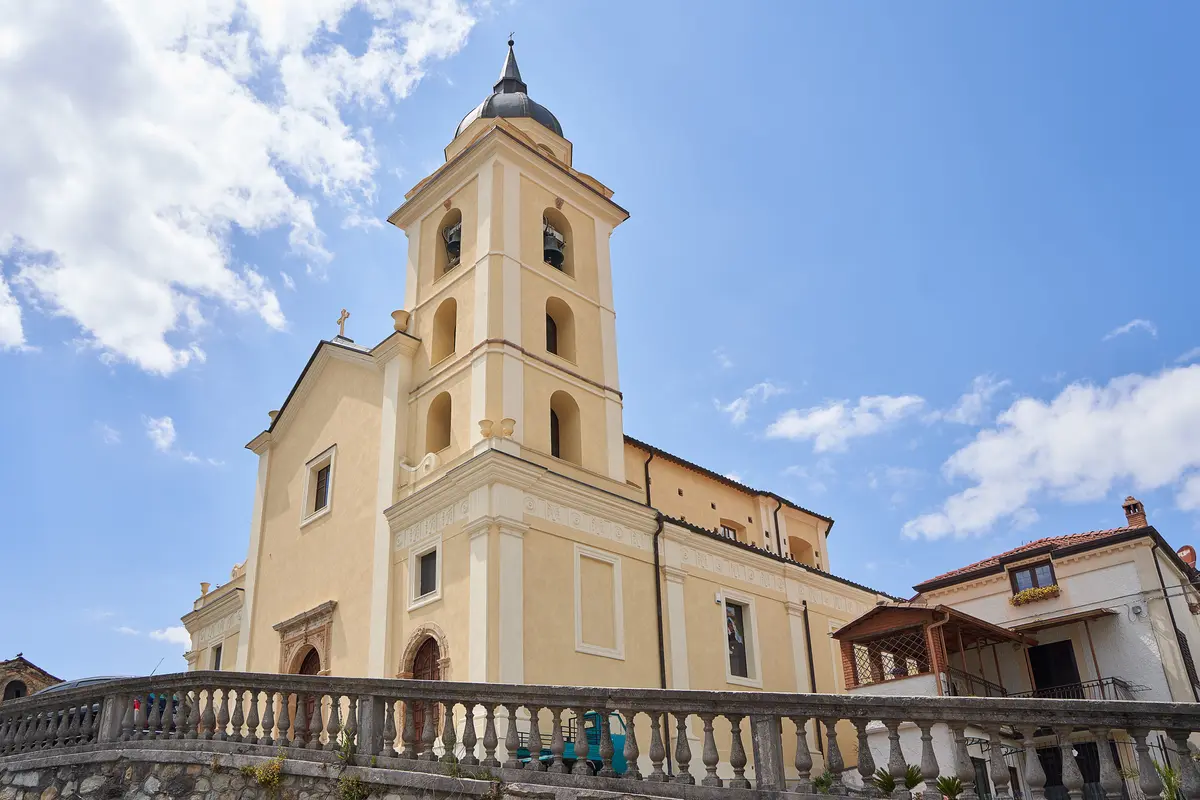Conflenti
Conflenti, the miracles of the Madonna della Visora

Town
Conflenti is a small town lying on a hill surrounded by a charming and untouched natural environment, among green firs, chestnut trees and centuries-old oak trees and on the slopes of monte Reventino in the province of Catanzaro.
The town stands in the heart of Calabria, on the Tyrrhenian side, a few kilometres far from both the seaside and the Sila, and visitors can easily get to Conflenti through the region’s main roads.
Today, the Santuario della Madonna della Quercia di Visora, with its heritage of history and culture, is the reason why Conflenti is known worldwide.
The inhabited centre is surrounded by the south-west side of the Silan Plateau whose main peaks are represented by Monte Reventino, which is 1417 metres high. Conflenti preserves art masterpieces as well as agricultural, craft and food-and-wine traditions. Conflenti greets visitors with a vast and remarkable artistic and landscape heritage that is the result of thousand-year old interactions between man and nature.
Legend claims that the first settlement of the town was founded by the defeated soldiers of Pyrrhus, the renowned king of Epirus who fought against the Romans during the first Punic War. The injured soldiers were in despair after the defeat, crying together, cum-flentes in Latin, which gave the name to the town. The soldiers retired to the thick forests at the foot of Monte Raventino and the villages of Conflenti originated there. Conflenti offers many places for spending pleasant hours outdoors in a truly spectacular natural setting including: Querciola (place where the madonna appeared and where a church was built in her honour and a large cross visible from the entire surrounding area), and the Spernuzzata that with its natural springs of mineral water makes summer picnics an unforgettable experience. The skilful artisans of Conflenti Superiore produced baskets, barrels, furniture, silk, wrought iron, embroidery, fabrics, wax, honey, sweets. The workshops of baskets and barrel makers, who worked with chestnut wood, were very renowned. Women weavers produced linen, cotton and broom fabrics on ancient looms.
Shrine of the Lady of Visora
In the years of the plague, Conflenti received a lot of attention due to a series of baffling facts that made the headlines around the Kingdom of Naples and even in the Vatican. These facts have been handed down as well as from tradition, also by a precious manuscript of the era containing the dossier drafted by the episcopal chancellor notary Nicolangelo Baratta in 1578-1579, when was assigned by the Bishop of Martirano, Perbenedetti, to ascertain their veracity, carrying out a real thorough investigation. The dossier collects stories told by the witnesses of the visions to the episcopal chancellor Baratta, on the apparitions of "a great Lady surrounded by doves". The Madonna had the same message for all: the request of the building of a temple in Visora. The laying of the first stone of the temple took place on 9 March 1580 and the works proceeded with incredible speed, so much so that after just seven months, the building was finished. Subsequently a painting was made of the Madonna and placed in the new temple. In the morning of 9 July 1581, the painter Muzio Roblan arrived in Conflenti for the task and went to church together with a committee to decide on how to prepare and where to paint this image. As tradition tells us, on opening the door of the Temple, the painting had already been painted and placed in its rightful place. The occurrence seemed like a miracle. The image of the Virgin, wrapped in a blue mantle that descends from the head to the shoulders, stands out on a golden background. The Virgin depicted in this painting, miraculously defined and painted by angels, was chosen as a protector and patron of the citizens of Conflenti who undertook to keep lit night and day a lamp in front of her altar. Today the Santuario della Madonna della Quercia di Visora (Shrine of our Lady of the Oak of Visora) is the reason why Conflenti is known worldwide. The interior of the temple is fascinating and the painting that created the miracle is kept safe on the altar. Several miraculous events have made the Madonna di Visora an important point of reference for many Calabrian people who come here to ask for healing. Today the devotion to Madonna di Visora is still so strong that the shrine welcomes worshippers every year who arrive in Conflenti in pilgrimage, especially during the period of the festivities that take place on the last Sunday of August.
Felici&Conflenti
Felici&Conflenti: This sentence is based on the sound of the word “conflenti” which reminds that of the word “contenti” (which means “happy/ happily satisfied); the word “felici” means “happy”.
Gastronomy
In Conflenti, typical home-made delicacies are made by many families using local honey. Some of these recipes follow methods which date back to the ancient Greeks, rooted in the local culture so much so as to become a heritage that has made Conflenti's pastries and sweets renowned all over Italy. Typical sweets not to be missed are Mostacciuoli, better known as ‘e mastazzola, typical sweets of Calabria and more specifically, Conflenti made with a base of flour and honey. A typical custom was to make one large enough to symbolise the wedding ring that was delivered to the groom's house to suggest that the bride was ready. Upon receiving it, the spouses broke the “mostacciolo” into two parts and whoever had taken the larger half, would have been the "head" of the family. Obviously, the groom's mother made clever short cuts to ensure that her son, who would have known about it, took the favourite piece. During Easter, the delicious aroma of “Cuzzupa” (a typical sweet during this period) fills the streets of Conflenti. The “cuzzupa” is a sweet symbol for the Easter period as it actually marks the end of fasting during Lent. Precisely, the whole egg placed on the sweet represents the rebirth and resurrection.
Useful information
What to know about Conflenti
Events
There are 1 events scheduled.
Where to Sleep
There are 2 available accommodations.
Travel Ideas
There are 1 travel ideas.
Infopoint Conflenti
via Marconi, Conflenti
No result






